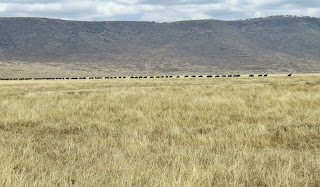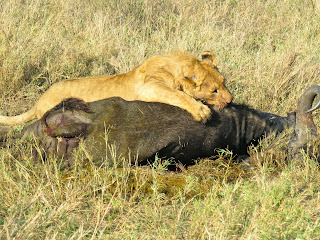Leaving the Serengeti
our hearts are filled with wonder.
Wonder = the
accessibility to the animals in their natural habitats, the proximity they
allow us as they go about their lives, to have slept with their sounds, to have
been present for even a few days in this special spot. . .
This morning I stepped
outside the tent to brush my teeth. After a few moments I felt something
tickling and prickling my legs. I had Safari ants in my pants. The only thing
to do was to get myself out of the pants. Any early riser might have looked
down the row of tents to see me dancing in my underwear.
 |
| Safari Ants |
 |
| Amish Works at the Serengeti Camp |
Our lions have killed a
buffalo in the night. The "mastermind" has figured out how to separate a
single cow from the herd. A single lion remains with the eviscerated carcass
and it’s evident the pride has eaten their fill. We were spectators at the
prelude to the kill, now we witness the aftermath.
Scavengers will come
after the lions are through. The hyenas will demolish what is left behind within
minutes.
One last view of a Mama warthog and her 4 piggies crossing the road, all tails up like radio antennae. Adorable!
As we leave the park we
start to see Maasai people and villages again.
Cattle, sheep and goats replace the wildlife. There’s an occasional
ostrich, giraffe and zebra that hasn’t yet discovered the “good life” inside
the park.
At the entrance to
Ngorongoro Crater a dirt track drops 2000 feet onto the caldera floor. We drive
it down to the bottom where 25,000 animals live within the 102 square mile
basin. They never have to leave because all their needs can be met. The only
animals not found here are the impala, the giraffe, and the female elephant,
(the steep sides are a deterrent).
Traffic in the crater
is reminiscent of Yellowstone National Park. A single lion sprawls in a shallow trench. Vehicles
crowd the road for a view. Ombeni asks “Will you tell these people what it’s
like to see a lion?”
 |
| Hartebeest |
 |
| The Auger Buzzard |
 |
| Hyenas Soaking in the Mud |
 |
| Crown Crane |
 |
| Wildebeest in Single File Like a Line of Ants in the Far Distance |
We bag our rhinos to complete the big 5. There are three in the far distance between ¼ and ½ mile away, (the crater is 10-12 miles across). Looking through the binoculars we can almost agree that we are seeing rhinos. They obligingly turn profile for us and display their horns. Well, OK then.
Our lunch spot is near
a hippo pool. Blue water, green rushes, trees, an oasis of sorts after the dry
Serengeti. The hippos sound like your neighbor trying to start his leaf blower
on Sunday morning but about three octaves lower.
 |
| Hippos |
A big green bus full of kids is on a field trip. Their school transports them to the crater rim where they transfer to the conservation bus for a tour.
Just as we’re heading
out we see rhino #4, still far away, but much closer, moving heavily along the
plain. We can see him with the naked eye and he looks like an armored truck
with an ivory horn. He’s plated with body armor. You can feel his weight just
by watching him move.
It starts to rain and we
can smell the fragrance of the grass seeping through the windows. We ascend a
red dirt road that quickly turns to slick mud. The crater fills with mist below
us, drawing a symbolic curtain on our game viewing experience.
We leave the crater
reserve and then drive onto pavement, an element that’s been missing from our
surroundings for several days.





























No comments:
Post a Comment